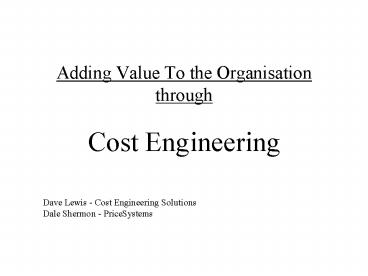Adding Value To the Organisation through - PowerPoint PPT Presentation
1 / 31
Title:
Adding Value To the Organisation through
Description:
Adding Value To the Organisation through Cost Engineering Dave Lewis - Cost Engineering Solutions Dale Shermon - PriceSystems The Problem Cost Engineers are under ... – PowerPoint PPT presentation
Number of Views:26
Avg rating:3.0/5.0
Title: Adding Value To the Organisation through
1
Adding Value To the Organisation through
- Cost Engineering
Dave Lewis - Cost Engineering Solutions Dale
Shermon - PriceSystems
2
The Problem
- Cost Engineers are
- under funded,
- not appreciated
- capabilities are not being recognised
- by their companies
3
- This presentation is provided, through the EACE,
and aims to address this problem by assisting you
in presenting the capabilities of the Cost
Engineering Process and how it adds value to your
organisation.
4
- Take these slides as a starting point for a
presentation to sell the capabilities of Cost
Engineering. - Select Format, Apply Design Template from the
menu to customise the presentation within your
organisation - Delete this slide and add, where appropriate
information relating to your own organisation.
5
Adding Value To the Organisation through the
Application of The Skills Process For
- Cost Engineering
6
Agenda Part 1
- Definition Of Cost Engineering
- The Cost Engineer
- Profile
- Primary Skills
- Qualifications
- Requirements
- Cost Data
- Cost Models
- Process Procedures
7
Definition Of Cost EngineeringAssociation of
Cost Engineers
- A Cost Engineer is, by education, training and
experience competent to develop and make
practical use of the principles of engineering
cost management which embraces activities such as
estimating, cost control, value engineering,
planning, construction management, investment
appraisal and risk analysis.
8
Definition Of Cost EngineeringCost Engineering
Capability Improvement Model
- Cost Estimating
- Cost Modelling
- Cost Control Analysis
- VA/VE Cost Reduction
- Planning(Schedule)
- Risk Management
- Cost Allocation
- DTC CAIV
- Supply Chain Support
- Knowledge Management
- Capital Asset Resource Management
- Business Analysis
- Business Case Development
- Audit
9
Why you should have Estimators ?
Accurately forecasting the cost of future work is
vital to the survival of any business. Estimators
develop cost related information for managers to
use in determination of resource and material
requirements, making bids, and assessment of the
profitability of new products. To do this
estimators compile and analyse data on all the
factors that can influence costs such as
materials, labour, machinery, past performance,
commercial conditions etc.
10
Meeting The Need 1 gt Experience
Technical Knowledge
Commercial Awareness
Financial Awareness
Profile
Understanding The Business
Communications Interpersonal Skills
Principles Of Project Management, Tasks relate to
PMBOK
11
Meeting The Need 1A gt Capabilities
Elements Of Cost
CBS/WBS
Estimating Methods
Costing Pricing
Types Purpose Of Estimates
Primary Skills
Operating Manufacture Costs
Cost Indices Escalation Factors
Risk Analysis/Contingency
Budgeting Cash Flow
HSE
12
Meeting The Need 2 gt Cost Data
Historical Project Cost Data
Cost Data
Estimate To Complete Data
Inflation / Cost Trend Indices
13
Meeting The Need 3 gt Cost Models
Appropriate to the Organisation and Application
Proprietary Cost Models
Spreadsheets
Cost Models
Rule Of Thumb
Cost Improvement Models
Economic Models
14
Meeting The Need 4 gt Process Procedures
Client Specifies
Process Procedures
In House
15
Meeting The Need 5 gt Qualifications
- NVQ/SVQ Project Control
- Certified Cost Engineer SCEA/ACostE ?
- Incorporated, Chartered or European Engineer
thro Engineering Council or Federation Of
National Engineering associations. - Certified Parametrician - ISPA
16
Agenda Part 2 Approach
- Scope/Definitions
- Project Execution Strategy
- Estimating Strategy
- Information Requirements
17
Scope / Definitions
Breakdown Structures
WBS
OBS
CBS
Scope / Definitions
Exclusions
Scope Boundaries
Schedule
18
Project Execution Strategy
Commercial Financial
Contracting Arrangements
Project Execution Strategy
Local Issues
Supply Chain Considerations
Competition
Alternative Strategies SWOT Analysis
19
Estimating Strategy
Degree Of Definition
Estimating Strategy
Schedule
Adopt Appropriate Technique
20
Information Requirements - 1
- Purpose/Use
- Project Stage
- Level quality Of Project scope
- Level quality Of data
- Time for preparation
- Resource Level/Availability
- companies Risk Culture
Type Of Cost Estimate Produced
21
Information Requirements - 2
- Project scope
- Project Specification
- Quantity
- Rates
- Schedule data
- Local factors/Performance data
- Escalation norms
Estimating Techniques vary - individual
constituent parts need to be available
22
Information Requirements - 3
Estimating Techniques Fall Into 2 Categories
Minimal Project Scope Or Design Definition
Deign Definition Or Project Scope Advanced
Bottoms Up/Detailed
Top Down/Parametric
23
Accuracy
Accuracy improves through course of the project
as scope definition firm up as costs move from
estimated to actual.
24
Information Requirements - 4
Actual Labour Hours Norms
Statistics
Estimating Manuals
Database
Technical Data
Perfomance data
Procurement data
Indices/Escalation
25
Typical Cost / Technical Trend Chart
26
Typical Cost Improvement Chart
27
Breakdown Of Cost by Element
5 Reduction 40 K
5 Reduction 5K
28
Supplier Comparison Graph
Supplier B is Cheaper Than A
29
Next Steps
Provide your own inputs on areas of financial
saving and benefits achieved.
Please also provide data to me for collation
presentation in Part 2
30
Next Steps 2
- Need to Collect Best Practice Data to include in
Part 2 - CECIM / Benchmarking Workshops
- Expand Into Cost Analysis(EVA etc) For Part 2.
- Need to generate Strengths Key Benefits
slides(Competences Training Sub Group) - Need to generate Financial Benefits
- Cost Of CE relative to Value Of work
- Cost Of CE relative to savings generated.
31
Further Information
For Further information please contact
dave.lewis_at_costeng-solutions.com or dale.sherm
on_at_pricesystems.com































